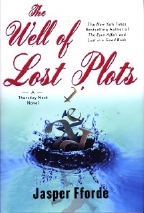Literature can be fun. When the pages have passed and the
characters have a chance to relax and unwind, even the stodgiest,
most uptight players have a lighter side and a sense of humor. And
while it's being fun -- really fun -- literature need not lose its
higher purpose. In fact, the best and most effective literature --
and we're talking about brows so high that they reach to the sky --
is really that which is the most enjoyable. Knee-slapping humor and
mind-boggling conceptualization are not of necessity mutually
exclusive. Humor is very difficult to pull off, however, and pairing
that humor with erudite thoughts on the intellectual process of
reading itself is not a job for the faint of heart.
Luckily, Jasper Fforde's Thursday Next is hardly faint of heart or
anything else. 'The Well of Lost Plots', Fforde's third book in the
series, digs deep into the process of reading itself. But it does so
while delivering a barrage of literary in-jokes, characters new and
old that readers will come to love if they don't already, and a
complicated intellectual plot that stitches together elements of
cyberpunk SF, Victorian fantasy and literary satire in a seamless and
entertaining story.
As 'The Well of Lost Plots' begins, Thursday Next is on a sort of
maternity leave. She's been hired by the Jurisfiction department to
help police the goings-on in works of literature. But as she's now
pregnant, she's sent to spend her time in an unpublished police
procedural, playing the bit part of a policewoman and spending the
balance of her days on a flying boat. But there's something big afoot
in the BookWorld. They're contemplating an upgrade to a new Book
Operating System, UltraWord. Anyone who has ever tried to upgrade
their computer -- or been in the vicinity of someone who has -- knows
that this is not a happy time.
Readers should be warned that this is the third book in a series,
and though a helpful synopsis of what's come before precedes the
novel, there's no doubt that they should be read in order; first
'The Eyre Affair' and
next 'Lost
in a Good Book'. Having read those
two entirely enjoyable tomes, readers might be excused for thinking
that Fforde is headed for a ffall; how could he keep improving when
he's writing to such a specific and odd idiom? But Fforde once again ups the
ante, and brings in a work that is hilariously funny and yet quite inventive
and thoughtful.
This book
is every bit as good as those that preceded it. It doesn't repeat the
riffs of the predecessors. Fforde has a number of new tricks up his
sleeve.
'The Well of Lost Plots' succeeds in large part because beyond
being quite funny, having a nicely turned mystery plot to keep things
moving forward, and extending and creating characters we love, it's
about something really interesting to most readers. 'The Well of Lost
Plots' is about nothing less than the process of reading and writing.
But given that it's a novel about reading and writing, it has a
number of undeniably powerful cinematic moments that speak to the
experience of reading in purely visual fashion. Fforde manages this
by creating a science fictional underpinning to the process of
reading.
In this novel, Fforde cleverly uses cyberpunk ideas and Victorian
technologies to creating a huge, creakingly enjoyable analog of the
intellectual process of reading and writing. It's a daring, daunting
task but Fforde is fully up to the challenge. From the Storycode Engines
to the Well of Lost Plots itself, this novel is chock full of
fascinating and very funny insights into the processes of both
reading and writing. Fforde manages a really stunning achievement in
this novel. He is simultaneously hilariously funny and deeply
insightful as to the intellectual process of reading. I'm not sure
how much has been written about the psychology and physiology of
reading, but 'The Well of Lost Plots' speaks, uh, volumes about how
we read, why we read, and how writers write and why they write. This
is a fully blown, very detailed science-fictional and fantastic
treatise on the nature of reading. When you're not thinking you'll be
laughing; and more often than not, both at once.
But Fforde has not abandoned the mystery plots that drive his
other novels, and the mystery here is equally enjoyable. To my mind,
Thursday does seem a bit active for a pregnant mother, but that's
easily brushed aside in the whirlwind of plot and character
complications of this book. Not only do you get the mystery that
plays out across the novel itself, but you also get the mystery
within the police procedural that Thursday Next comes to call home.
Both levels are quite different and quite enjoyable.
As I came to this novel late in the game, I was able to read the
American version, which includes another chapter tacked on the end. I
have to admit I was quite worried that this addition would spoil the
flow of the novel by adding an unnecessary tail, but that's not the
case. There are still unique aspects of each edition, American and
English. I can't imagine anyone who reads and enjoys this book would
not want to own both. By now it's going to be a bit pricey, but it's
well worth it. Fforde's novels now include several pages of quaint,
quirky illustrated advertisements. The UK edition has one that the US
version lacks. The UK edition also has a line drawing B&W
frontispiece illustration that the US version lacks. The US version
on the other hand, has a full color plate that the UK version lacks,
and that additional chapter. 'The Well of Lost Plots' is a truly
astounding book on any number of levels. It's funny, fiercely but
unpretentiously intellectual and filled with lovable characters.
Fforde puts them all together seamlessly. He clearly has a
magnificent Storycode engine in his basement.

